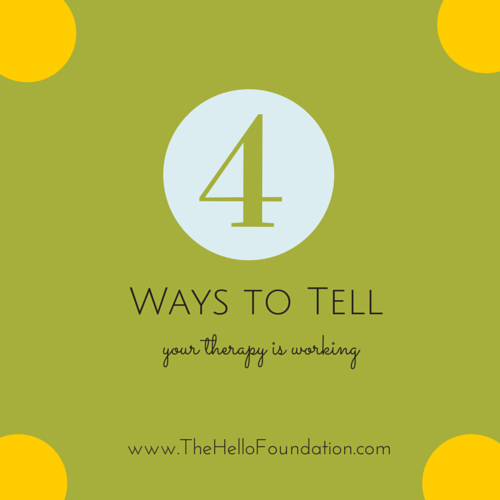It seems like a question all of us should be able to answer: Is my therapy working? But it is more difficult to pin down than it seems. After conversations with several colleagues and some careful thought during my own therapy sessions, I’ve nailed down some factors to think about.
4 Ways to Tell if Your Speech Therapy is Working
You’ll know your therapy is working if…
1. You have data to back you up
This may sound obvious, but good data, especially on great functional goals, can be hard to come by! If multiple people are working with the student (think SLP, SLPA, aide, etc.) or if activities vary based on context, then tallies or plus/minus marks may not tell the whole story. I find intermittent video recordings can be a very thorough and efficient way of tracking progress on speech/language goals. Take an audio or video recording of a language task (story retelling, reading aloud, talking about your weekend, etc.) once a month or once a quarter, and you’ll have an easy way to look at skills and accuracy – you may even go back and look at skills you didn’t know you’d be targeting!
2. Your Students Understand Their Goals
The student knows their goals and, in a developmentally appropriate way, can tell you and others what her job is in working on them. For example, “I’m working on my /k-k-k/ ‘scraper’ sound. These are the words I’m practicing…” or ” I’m working on ways to learn new words. When I draw pictures, it helps me remember.” or “I’m learning about question words like ‘who’ and ‘when.’ Each one means a special thing.”
3. Your Collaborators Tell You It’s Working!
It’s true, you should not be doing this all on your own. The best and most effective therapy involves other people in different contexts for observation, cueing and reminding, and practice! Parents and teachers are the most obvious, but especially when there are some skills to generalize, there is no reason you couldn’t have the secretary, lunch lady, or bus driver in on it, as well! These collaborators can be valuable sources for information on successes, as well as areas of continued need.
4. Your Goals are Well-Written
We’ve all been there – frustrated trying to measure progress because we didn’t write the means for measuring into the original goal! We know our goals should be measurable. One of the most important times to think about how you’ll know if therapy is working is when you’re writing the goal!
How do YOU know your therapy is working? What are the most meaningful ways to share that progress with team members?






